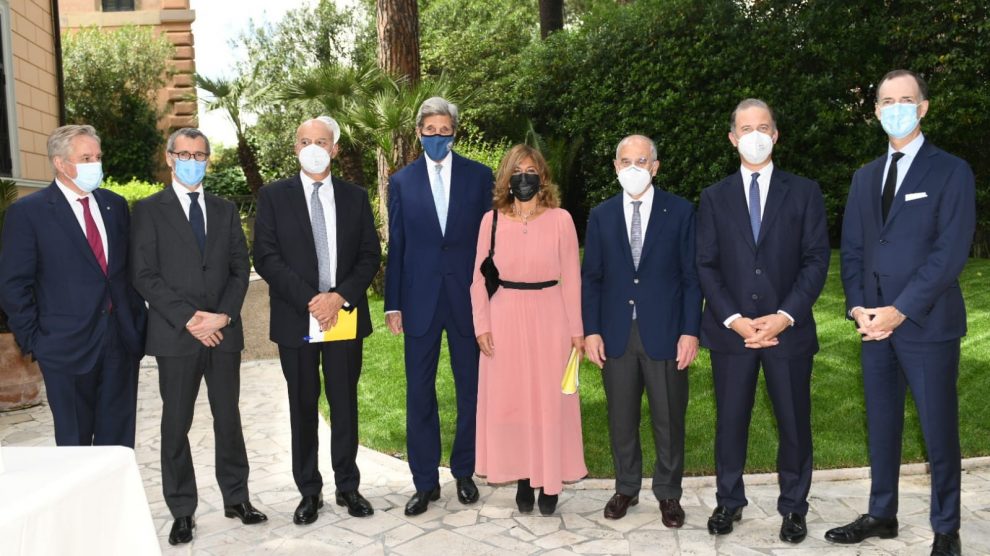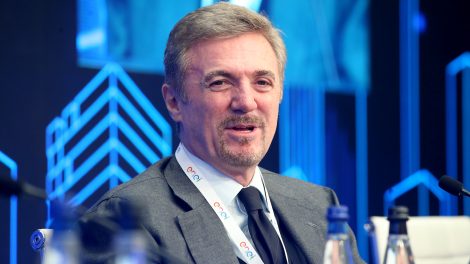The first day of the Business 20 Final Meeting, hosted by Confindustria and led by entrepreneur Emma Marcegaglia in her capacity as B20 Chairwoman, wrapped up after a nearly three-hour flurry of speeches and panels. The second and final day, on October 8, will feature a host of institutional and industry leaders.
Involving roughly 2,000 participants and representing an overall business community of 6.5 million companies, the G20 business forum has been working through thematic groups throughout the year to present policy recommendations in line with the goals of the Italian-led G20, encapsulated in the slogan people, planet, prosperity.
In his opening speech, Finance Minister Daniele Franco took stock of the pandemic experience, exhorted to look at the future “with cautious optimism” and underscored Italy’s efforts to link finances and health ministries to foster emergency preparedness. Then he gave way to a string of fellow ministers and business representatives, who presented and discussed the task forces’ policy recommendations.
“We’ve identified three main threats: environmental disasters, contagious diseases and cyber incidents,” said the CEO of Eni and President of the Sustainability and Global Emergencies Action Council, Claudio Descalzi.
He then presented three respective solutions: a just ecological transition – which will only be such “if we are able to share the costs equally, without burdening the most vulnerable communities” – along with complex disaster management mechanisms, increased systemic resiliency and stronger data management infrastructures.
Greening the economies need not be a jarring exercise, added Enel’s Francesco Starace, head of the Task Force on Energy and Resource Efficiency, as “there is no trade-off between what’s good for the economy and the environment,” an alignment rooted in advancements in digital technology and materials science.
His policy proposals centred on shifting energy use to clean energy, leveraging sustainable finance to foster sustainable growth, drive carbon pricing (and stand by the idea that it must be adequately priced), and increase the supply chains’ resilience to the threats identified by Mr Descalzi’s Action Council.
Mr Starace then remarked that global economies were consuming the world’s resources 1.7 times faster than they can regenerate, meaning that “we’re eating into the resources of future generations.” The solution entails circular economies and increased sustainability, he added, and G20 countries “have the opportunity to make of this transformation not a source of inequality, but rather a force that can solve it.”
That’s where finance and infrastructures come in, argued the CEO of Intesa Sanpaolo and head of the Task Force on Finance and Infrastructure Carlo Messina, as they can have an outsized role in fostering the mitigation of inequality.
Lenders must increase the role of sustainable finance – for instance, he said, by adding ESG criteria and impact measurement to ensure accountability and prevent greenwashing. Urban regeneration, i.e. renovating cities via hospitals, efficient mobility, communications networks, schools and educations, is also a value-creating area of investment, a veritable pipeline for platforms to participate in sustainable projects, in need of dedicated funds.
Moreover, said Mr Messina, there’s the need for a green growth engine: easier access to debt and equity markets to SMEs and a global regulatory environment – entailing a review of the financial sector regulatory framework – to allow all parts of the productive world to partake in the transition.
As the Minister for the Ecological Transition Roberto Cingolani remarked throughout the event, the G20 – representing the 4.8 bn people that produce 80% of the world’s emissions – are uniquely positioned to drive impactful change. Climate change, he said, is a massive problem that requires to be treated synergistically with global inequalities – lest those undermine positive change.
“The collaboration between public and private is fundamental to redirect investments towards the UN’s sustainable development goals,” said Foreign Minister Luigi Di Maio in his closing remarks. “The private sector’s contribution to policymaking is demonstrated by the vast participation of all sorts of companies to the UN Global Compact: the Italian sector has shown great commitment in the development of sustainable practices.”




